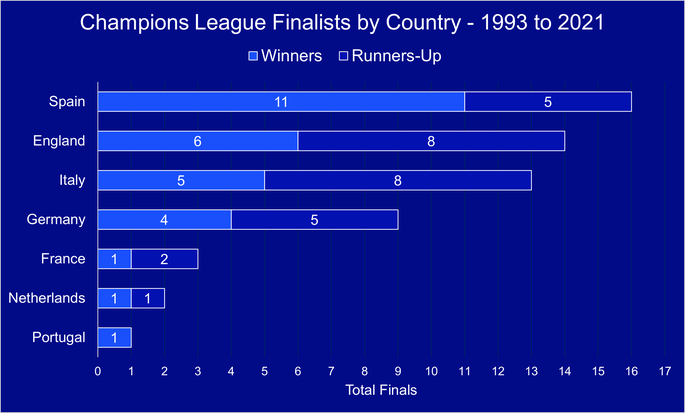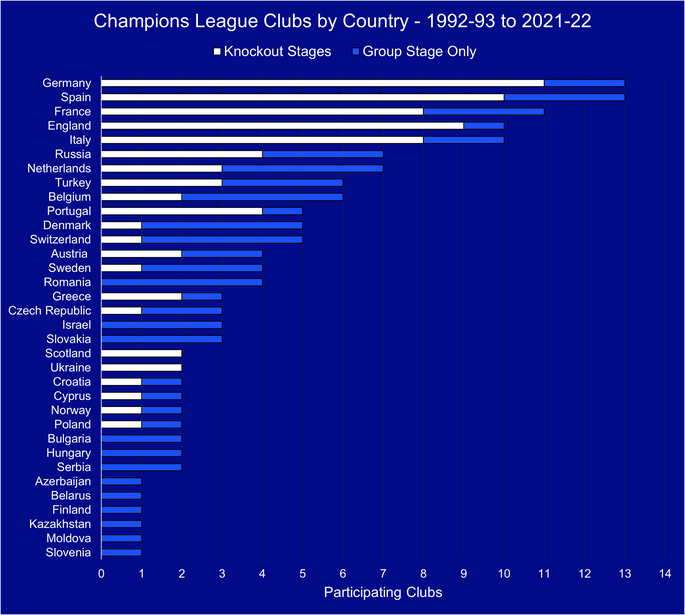 There has always been something odd about the naming of the Champions League, considering the fact that teams don’t need to be the champions of their own country in order to be part of it. When Liverpool won it in the 2004-2005 campaign, for example, they had finished fourth the season before and ended up in fifth place at the end of that season, only re-gaining entry into the competition on account of the fact that they won it. Even so, the tournament remains the biggest club competition in the world and teams that win it, whether champions of their own country or not, are worthy of their victory.
There has always been something odd about the naming of the Champions League, considering the fact that teams don’t need to be the champions of their own country in order to be part of it. When Liverpool won it in the 2004-2005 campaign, for example, they had finished fourth the season before and ended up in fifth place at the end of that season, only re-gaining entry into the competition on account of the fact that they won it. Even so, the tournament remains the biggest club competition in the world and teams that win it, whether champions of their own country or not, are worthy of their victory.
The very nature of the competition is such that football clubs from around Europe are desperate to win it. It is noteworthy that winning countries seem to come in waves, with some nations dominating for a period of time before others take over. Though it launched as the European Cup in 1955, it has been known as the Champions League since it rebranded in 1992, coinciding with the English top-flight’s rebrand as the Premier League. On this page, we’re looking very specifically at the competition post-1992, meaning that wins when it was the European Cup will be discarded.
Which Country Is the Champions League’s Most Successful?
Since the first Champions League final in 1993 until the 29th final in 2021, Spanish clubs have had the most trophies with 11, ahead of England with 6, Italy with 5 and Germany with 4.
Between the 1992-93 and 2021-22 seasons, Germany and Spain have had the most clubs to have participated in the competition from the group stage onwards with 13 different teams taking part from each. This is ahead of France with 11, England and Italy with 10 and the Netherlands and Russia with 7.
Germany has had highest number of different clubs reaching the knockout stages in this time period with 11 clubs. This is ahead of Spain with 10, England with 9 and Italy and France both with 8.
The Champions League Winners
In order to get a good sense of which nation has been the most successful in the Champions League, it is only right that we start off by looking specifically at the winners of the tournament. It is certainly fair to say that the teams that make the final of a tournament can be considered to be the best in it for that year, even if there is occasionally a team that makes it all the way in spite of their perceived ability rather than because of it. Here is a look at the two teams that made the final every year since the 1992-1993 season, alongside their country of origin:
List of Champions League Finalists – 1993 to 2021
| Season | Winner (Country) | Runner-Up (Country) |
|---|---|---|
| 2020-2021 | Chelsea (England) | Manchester City (England) |
| 2019-2020 | Bayern Munich (Germany) | Paris Saint-Germain (France) |
| 2018-2019 | Liverpool (England) | Tottenham Hotspur (England) |
| 2017-2018 | Real Madrid (Spain) | Liverpool (England) |
| 2016-2017 | Real Madrid (Spain) | Juventus (Italy) |
| 2015-2016 | Real Madrid (Spain) | Atletico Madrid (Spain) |
| 2014-2015 | Barcelona (Spain) | Juventus (Italy) |
| 2013-2014 | Real Madrid (Spain) | Atletico Madrid (Spain) |
| 2012-2013 | Bayern Munich (Germany) | Borussia Dortmund (Germany) |
| 2011-2012 | Chelsea (England) | Bayern Munich (Germany) |
| 2010-2011 | Barcelona (Spain) | Manchester United (England) |
| 2009-2010 | Inter Milan (Italy) | Bayern Munich (Germany) |
| 2008-2009 | Barcelona (Spain) | Manchester United (England) |
| 2007-2008 | Manchester United (England) | Chelsea (England) |
| 2006-2007 | AC Milan (Italy) | Liverpool (England) |
| 2005-2006 | Barcelona (Spain) | Arsenal (England) |
| 2004-2005 | Liverpool (England) | AC Milan (Italy) |
| 2003-2004 | Porto (Portugal) | Monaco (France) |
| 2002-2003 | AC Milan (Italy) | Juventus (Italy) |
| 2001-2002 | Real Madrid (Spain) | Bayer Leverkusen (Germany) |
| 2000-2001 | Bayern Munich (Germany) | Valencia (>Spain) |
| 1999-2000 | Real Madrid (Spain) | Valencia (Spain) |
| 1998-1999 | Manchester United (England) | Bayern Munich (Germany) |
| 1997-1998 | Real Madrid (Spain) | Juventus (Italy) |
| 1996-1997 | Borussia Dortmund (Germany) | Juventus (Italy) |
| 1995-1996 | Juventus (Italy) | Ajax (Netherlands) |
| 1994-1995 | Ajax (Netherlands) | AC Milan (Italy) |
| 1993-1994 | AC Milan (Italy) | Barcelona (Spain) |
| 1992-1993 | Marseille (France) | AC Milan (Italy) |
It is far to say that the word ‘Spain’ crops up time and time again in the above list, but does that automatically mean that the Spanish have enjoyed the most success since the Champions League launch? Here’s a look at each of the countries and the number of times that they’ve had either the winner of the competition or else the runner-up:

If you were to implement a system whereby a Champions League win would mean the country gets two points whilst a team finishing as runners-up in the competition would result in the country they represent being awarded one point, the following would be the amount of points amassed by each country that has had at least one finalist:
Most Successful Countries – 1993 to 2021
| Country | Winners (2pts) | Runners-Up (1pt) | Total Points |
|---|---|---|---|
| Spain | 22 points | 5 points | 27 points |
| England | 12 points | 8 points | 20 points |
| Italy | 10 points | 8 points | 18 points |
| Germany | 8 points | 5 points | 13 points |
| France | 2 points | 2 points | 4 points |
| Netherlands | 2 points | 1 point | 3 points |
| Portugal | 2 points | 0 points | 2 points |
Spain are obviously the biggest winners of the Champions League since its launch in 1992, with England and then Italy following it up. It is more likely that England will catch Spain up before Italy, given that there have been five English finalists and two winners since Italy last had a representative in the final, plus three English winners since an Italian team last won the trophy.
Clubs Playing in the Champions League Proper
Since the Champions League launched in 1992, 146 different football clubs from across 34 nations have appeared in the group stage of the competition. The obvious question is which nations and how many clubs have played Champions League football? Here’s a look at answering exactly that question, with the information being up-to-date as of the 2021-2022 campaign:

It is difficult to tell how important making it to the group stage of the Champions League is when you consider that some clubs have a high enough co-efficient to mean that a given number of teams will always qualify for that state of the competition. Is the fact that Scotland have only had two teams in the group stage of the tournament and both of them have qualified for the knockout stage worth more than Slovakia having three teams in the groups but have never seen any of them make it through to the knockouts?
If we take our formula from before but tweak it slightly, so that teams that make it the knockout stage of the competition are awarded two points whilst those that only ever make it to the group stage are awarded one, that will perhaps give us a better sense of a nation’s strength in the competition. The information then breaks down as follows:
Champions League Clubs by Country – 1992-93 to 2021-22
| Country | Group Stage Only (1pt) | Knockout Stage (2pts) | Total Points |
|---|---|---|---|
| Germany | 2 points | 22 points | 24 points |
| Spain | 3 points | 20 points | 23 points |
| England | 1 point | 18 points | 19 points |
| France | 3 points | 16 points | 19 points |
| Italy | 2 points | 16 points | 18 points |
| Russia | 3 points | 8 points | 11 points |
| Netherlands | 4 points | 6 points | 10 points |
| Portugal | 1 point | 8 points | 9 points |
| Turkey | 3 points | 6 points | 9 points |
| Belgium | 4 points | 4 points | 8 points |
| Austria | 2 points | 4 points | 6 points |
| Denmark | 4 points | 2 points | 6 points |
| Switzerland | 4 points | 2 points | 6 points |
| Greece | 1 point | 4 points | 5 points |
| Sweden | 3 points | 2 points | 5 points |
| Scotland | 0 points | 4 points | 4 points |
| Ukraine | 0 points | 4 points | 4 points |
| Czech Republic | 2 points | 2 points | 4 points |
| Romania | 4 points | 0 points | 4 points |
| Croatia | 1 point | 2 points | 3 points |
| Cyprus | 1 point | 2 points | 3 points |
| Norway | 1 point | 2 points | 3 points |
| Poland | 1 point | 2 points | 3 points |
| Israel | 3 points | 0 points | 3 points |
| Slovakia | 3 points | 0 points | 3 points |
| Bulgaria | 2 points | 0 points | 2 points |
| Hungary | 2 points | 0 points | 2 points |
| Serbia | 2 points | 0 points | 2 points |
| Azerbaijan | 1 point | 0 points | 1 point |
| Belarus | 1 point | 0 points | 1 point |
| Finland | 1 point | 0 points | 1 point |
| Kazakhstan | 1 point | 0 points | 1 point |
| Moldova | 1 point | 0 points | 1 point |
| Slovenia | 1 point | 0 points | 1 point |
It is interesting to see that, if you give more weight to making it into the knockout rounds than simply getting to the group stage, Germany have been more successful than Spain. There are also some instance where a nation that has had fewer teams make it to the group stage overall ends up with more points than countries that have had more competitors but fewer knockout stage appearances.
Which Country Has the Best Overall Record?
It is obviously difficult to make an clear and obvious statements about the Champions League and the success of the countries that have had clubs appearing in it over the years. As a result, what we’ll do is look to combine the points won in our two systems to see which nations have achieved the most over the years. With winning the Champions League being worth two points along with making it to the knockout stages and being a losing finalist and simply making it the group stage both worth one, here’s how the seven most successful countries work out:
Champions League Top Ranked Countries
| Rank | Country | Finalist Points | Participant Points | Total Points |
|---|---|---|---|---|
| 1 | Spain | 27 points | 23 points | 50 points |
| 2 | England | 20 points | 19 points | 39 points |
| 3 | Germany | 13 points | 24 points | 37 points |
| 4 | Italy | 18 points | 18 points | 36 points |
| 5 | France | 4 points | 19 points | 23 points |
| 6 | Netherlands | 3 points | 10 point | 13 points |
| 7 | Portugal | 2 points | 9 points | 11 points |
Using this combined points-scoring metric, Spain is definitively the country with the best Champions League record. Interestingly, Germany overtakes Italy in terms of combined points, with Italy having been leading Germany in terms of Champions League finals reached and won. If you ask someone to name the most successful European countries, they will almost certainly put France at the bottom of the ‘big five’, which ties with the country’s success in the Champions League since its rebrand in 1992.
